Apartment Building Elevator Installation Cost Estimator
Installing an elevator in an apartment building is a substantial investment that can greatly enhance accessibility, tenant satisfaction, and property value. As a critical component of modern multi-story buildings, elevators improve mobility for residents and can make your property more appealing to potential tenants. At Estimate Florida Consulting, we provide precise estimates to help you budget effectively for this essential feature. This guide offers a detailed breakdown of elevator installation costs, providing insights to ensure you make informed decisions.
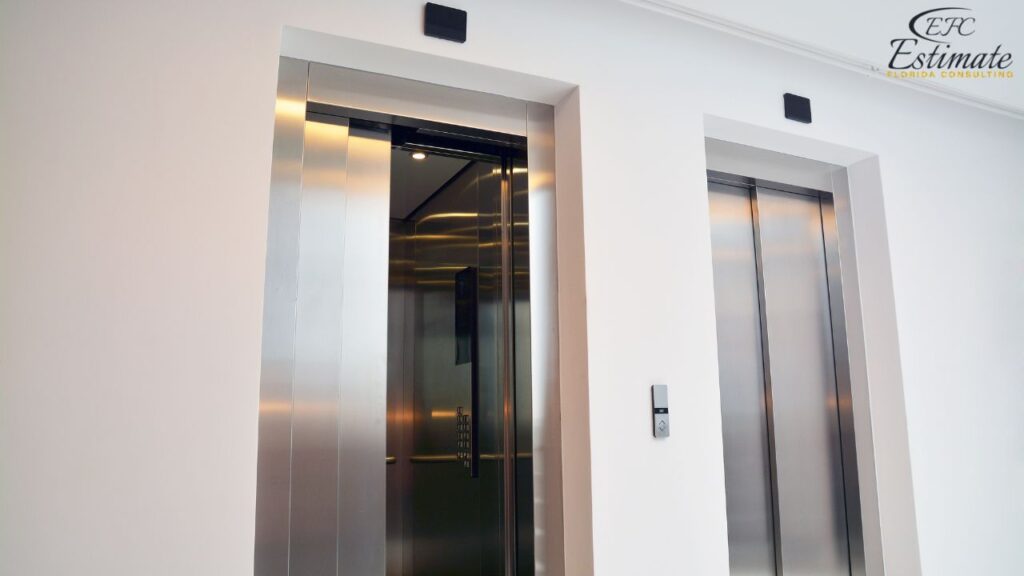
By understanding the factors that influence costs, you can optimize your investment, ensuring the elevator not only meets but exceeds expectations in terms of performance and longevity.
How Much Does Elevator Installation Cost in Apartment Buildings?
The cost of installing an elevator in an apartment building can vary widely based on several factors, including the type of elevator, building structure, and specific features desired. On average, the cost of installing a standard passenger elevator ranges from $60,000 to $300,000. These costs depend significantly on whether the building is being newly constructed or retrofitted with an elevator, as well as the number of floors the elevator will service. Understanding these variables is key to budgeting effectively and ensuring the elevator meets the building’s needs and enhances overall accessibility. An elevator not only provides convenience for residents but also increases the building’s market value, making it an attractive feature for prospective buyers or renters. Additionally, the presence of an elevator can significantly enhance the quality of life for residents with mobility challenges, thus widening the potential tenant base and improving the building’s appeal.
Average Cost of an Elevator Installation for Apartment Buildings
The average cost of installing an elevator in an apartment building typically falls between $100,000 and $150,000. This range includes the cost of the elevator unit itself, installation labor, and any necessary modifications to the building. Factors such as the building’s height, the type of elevator system, and the level of customization can impact the total cost. Installing an elevator is not only about improving accessibility but also about adding value to the property, making it a strategic investment for building owners looking to increase their property’s market appeal and functionality. The increased accessibility provided by elevators can attract a wider range of tenants, including seniors and individuals with mobility challenges, thus enhancing tenant diversity and satisfaction. Furthermore, elevators can lead to higher rental rates and occupancy levels, providing a solid return on investment over time.
Elevator Installation Cost by Capacity
The capacity of an elevator impacts its cost, with larger elevators requiring more robust systems and potentially more space. The capacity is determined by the building’s size, expected traffic, and the nature of the tenants’ needs. Larger elevators are typically more expensive due to the need for stronger materials and more powerful motors, but they provide the advantage of accommodating more passengers at once, reducing wait times during peak usage periods.
- Standard Capacity:Suitable for small to mid-sized buildings with less frequent usage. They are typically used in buildings where space is limited, and cost efficiency is a priority. Standard capacity elevators are often chosen for residential buildings where the traffic volume is predictable and manageable.
- Medium Capacity: Offers increased capacity for buildings with moderate to heavy traffic. These elevators are designed to accommodate more passengers and are ideal for properties that experience high usage during peak hours. Medium capacity elevators are common in commercial and mixed-use buildings where tenant needs can vary widely.
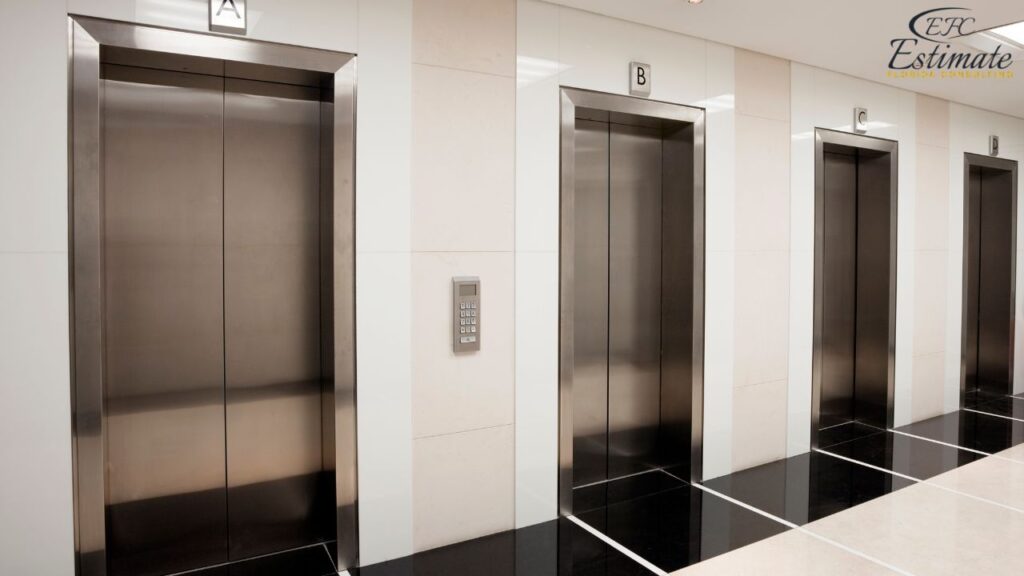
- Large Capacity: Designed for high-traffic buildings, these elevators can handle more weight and offer faster travel speeds. They are perfect for high-rise buildings, commercial complexes, or properties with specialized requirements such as moving goods or equipment. Large capacity elevators often feature advanced controls and safety systems to ensure efficient and safe operation even under heavy load conditions.
Capacity | Estimated Cost Range |
Standard (up to 1,500 lbs) | $78,000 – $117,000 |
Medium (up to 2,500 lbs) | $117,000 – $195,000 |
Large (up to 4,000 lbs) | $195,000 – $325,000 |
Elevator Installation Cost by Features
The features and technology included in an elevator system can significantly affect its cost. Advanced features can improve safety, efficiency, and user experience but often come with a higher price tag. Selecting the right features involves balancing cost with the level of service and convenience you wish to provide to tenants.
- Basic Features: Standard controls, basic interior finishes, and standard lighting. These are sufficient for basic functionality and cost savings. Basic elevators provide the necessary service without frills, making them suitable for buildings where budget constraints are a primary concern.
- Advanced Features: Custom finishes, touchscreen controls, enhanced safety features, and energy-efficient lighting and systems. These features enhance user experience and add value to the building. Advanced elevators are often equipped with features like destination dispatch systems, which optimize elevator operation by grouping passengers traveling to the same floors.
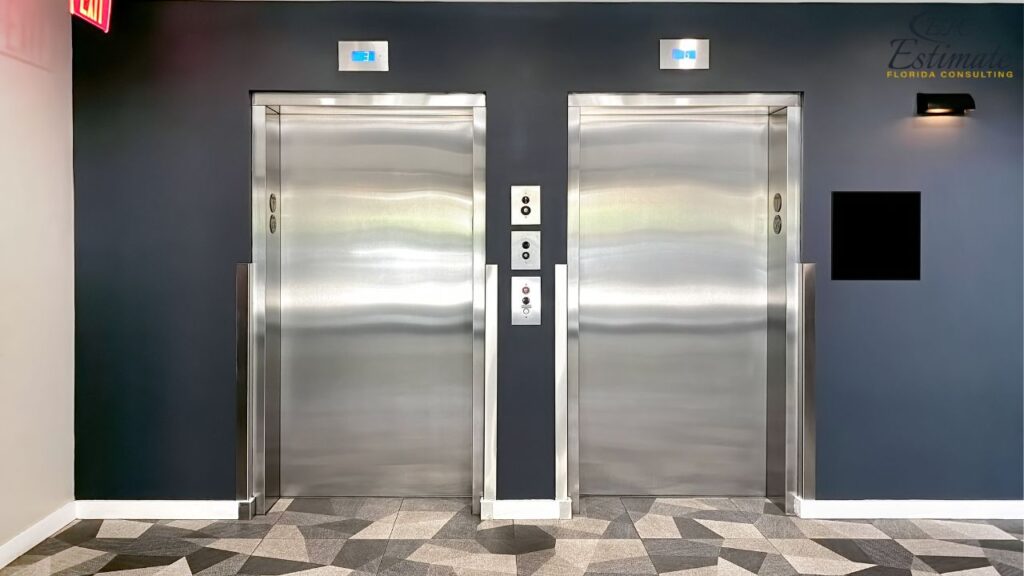
- Premium Features: Smart technology integration, custom cab designs, voice-activated controls, and high-speed capabilities. These features are ideal for luxury properties aiming to offer top-tier service and modern conveniences. Premium elevators can include options such as biometric access control and personalized ride settings, providing a unique and luxurious experience for users.
Features | Estimated Cost Range |
Basic | $78,000 – $130,000 |
Advanced | $130,000 – $234,000 |
Premium | $234,000 – $390,000 |
Energy Efficient Elevator Installation Costs
Energy-efficient elevators may have a higher initial cost but offer long-term savings through reduced energy consumption. These elevators are designed to minimize energy usage and environmental impact, providing benefits such as lower operating costs and reduced carbon footprint. Energy-efficient elevators often use regenerative drives, which capture energy generated during braking and feed it back into the building’s electrical system. This technology not only reduces energy consumption but also helps stabilize the building’s power supply, leading to further cost savings over time. Additionally, energy-efficient elevators are equipped with LED lighting and sleep mode functions that conserve energy when the elevator is not in use, contributing to significant reductions in operational costs over the elevator’s lifespan.
- Cost Range: $120,000 – $250,000
- Benefits: Lower operating costs, reduced carbon footprint, potential tax incentives
Feature | Description |
Energy Savings | Up to 40% reduction in energy usage |
Technology | Regenerative drives, LED lighting |
Incentives | Potential for tax credits and rebates |
Videos For Elevator Installation
Elevator Installation
Elevator Installation
Elevator Replacement
Whole Apartment Elevator Installation Cost
Installing elevators throughout an entire apartment building involves scaling costs based on the number of units and floors. The overall cost will depend on the specific requirements of the building and the number of elevators needed to meet tenant demands. For large apartment complexes, installing multiple elevators can significantly enhance accessibility and reduce wait times, thus improving tenant satisfaction. However, these installations also require careful planning to ensure that the elevators integrate seamlessly with the building’s architecture and do not disrupt existing infrastructure. Strategic placement of elevators and careful consideration of tenant flow patterns can optimize efficiency and ensure that the investment delivers maximum value in terms of convenience and accessibility.
- Estimated Total Cost Range: $300,000 – $1,500,000
Labor Costs for New Elevators
Labor costs for elevator installation vary based on the complexity of the project and regional labor rates. On average, labor costs account for 30-40% of the total installation cost. These costs include not only the physical installation of the elevator system but also the preparation of the site, including any necessary modifications to the building’s structure. Complex installations, such as those in older buildings or high-rise constructions, may require specialized labor and additional time, thus increasing overall labor expenses. It is crucial to work with experienced contractors who can efficiently manage the installation process, ensuring that the project stays on schedule and within budget while meeting all safety and regulatory requirements.
Labor Type | Estimated Cost Range |
Basic Installation | $20,000 – $40,000 |
Complex Installation | $40,000 – $80,000 |
Custom Work | $80,000 – $120,000 |
Low-Cost Elevator Installation for Budget Apartments
Low-cost elevator installation options are designed for budget-conscious projects and typically feature basic designs and fewer advanced features. These elevators provide essential functionality without extensive customization, making them suitable for smaller buildings or those with less demanding requirements. They are often hydraulic systems, which are ideal for low-rise buildings up to five stories, offering a straightforward and effective solution for improving accessibility at an economical price. While these options may lack the advanced features of more expensive models, they ensure that all residents can easily access their homes, thereby improving overall building accessibility and convenience.
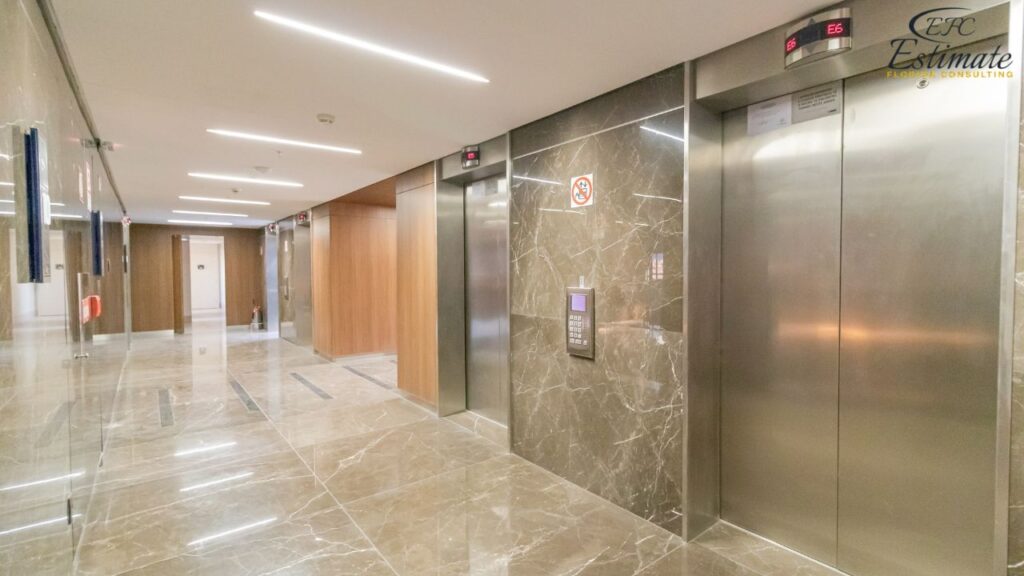
The installation of a basic elevator can significantly enhance the livability of an apartment building by facilitating the movement of people, especially the elderly or those with disabilities, and by easing the transport of goods such as groceries and furniture.
- Cost Range: $60,000 – $80,000
- Features: Basic elevator systems, limited customization, standard finishes
- Ideal for: Budget apartments, small buildings, basic accessibility needs
Feature | Description |
System Type | Hydraulic or basic traction |
Capacity | Standard (up to 1,500 lbs) |
Speed | Moderate (100-200 ft/min) |
Stops | Limited (up to 5 floors) |
Medium-Cost Elevator Installation for Mid-Range Apartments
Medium-cost elevator installations offer a balance between affordability and enhanced features. These elevators often include improved materials and better energy efficiency, making them a good choice for mid-range apartment buildings looking to offer more comfort and reliability. They may include geared traction or machine-room-less (MRL) systems that optimize space usage and efficiency. These elevators provide smoother rides and can accommodate more frequent usage than basic models, making them suitable for buildings with moderate traffic. They strike an excellent balance between cost and performance, providing a durable and efficient solution that meets most building requirements.
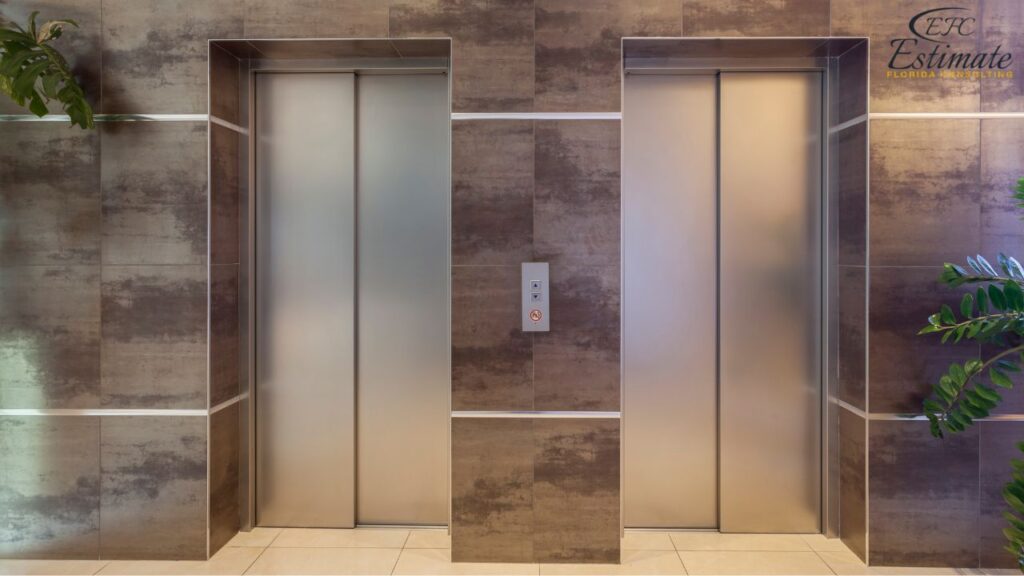
Moreover, medium-cost elevators often come with a variety of design options and finishes, allowing property owners to maintain a cohesive aesthetic that complements the building’s overall design.
- Cost Range: $100,000 – $150,000
- Features: Improved materials, energy-efficient systems, moderate customization
- Ideal for: Mid-range properties, buildings with moderate traffic
Feature | Description |
System Type | Geared traction or machine-room-less (MRL) |
Capacity | Medium (up to 2,500 lbs) |
Speed | Moderate to high (200-350 ft/min) |
Stops | Medium (up to 10 floors) |
High-Cost Elevator Installation for Luxury Apartments
High-cost elevator installations prioritize premium materials, advanced features, and high performance. These elevators are often customized to meet specific aesthetic and functional requirements, offering top-tier service for luxury apartment buildings where tenant expectations are high. They are typically high-speed traction systems that can handle heavy traffic and provide rapid transport between multiple floors. These elevators may include custom interiors, touchless controls, and integrated smart technology, making them ideal for high-end properties seeking to deliver an exceptional tenant experience. Investing in high-cost elevators reflects a commitment to quality and luxury, enhancing the building’s prestige and appeal. Such elevators are designed not only for maximum efficiency and performance but also to complement the luxurious feel of the building, with options for bespoke interior finishes and advanced control systems that enhance user experience.
- Cost Range: $150,000 – $300,000+
- Features: High-speed systems, custom interiors, advanced technology
- Ideal for: Luxury properties, high-rise buildings, buildings with heavy traffic
Feature | Description |
System Type | High-speed traction |
Capacity | Large (up to 4,000 lbs) |
Speed | High (350-500 ft/min) |
Stops | Extensive (10+ floors) |
Elevator Installation Cost Calculator for Apartments
Our elevator installation cost calculator helps you get a personalized estimate based on specific building parameters and elevator preferences. By entering details such as the number of floors, type of elevator, and additional features, you can receive a tailored cost estimate that aligns with your project goals. This tool assists building owners and managers in understanding the financial implications of different elevator choices, enabling more informed decision-making that balances budget constraints with desired functionality and quality. The calculator also helps identify potential cost savings by comparing different options, allowing you to choose the most efficient and cost-effective solution for your building’s unique needs. Additionally, it offers insights into how certain features, such as energy efficiency or premium finishes, can impact overall costs, helping you prioritize based on your specific project requirements and financial objectives.
Elevator Installation Cost Factors
Several factors influence the overall cost of elevator installation, including:
- Building Height: Taller buildings require more complex and expensive elevator systems. The height of the building directly impacts the type of elevator needed, as higher buildings often require faster and more robust systems to efficiently transport passengers.
- Customization: Unique designs and high-end materials can increase costs. Custom elevators often involve additional engineering and design work to ensure that the final product meets specific aesthetic and functional requirements.
- Installation Complexity: Factors such as building structure and existing infrastructure can impact installation costs. Older buildings may require significant modifications to accommodate new elevator systems, while new constructions can be designed with elevators in mind, reducing potential complications.
- Regulatory Compliance: Meeting local codes and safety standards can add to expenses. Ensuring that the elevator installation complies with all relevant regulations is crucial to avoid potential fines or delays, and it often involves additional inspections and approvals from regulatory bodies.
Additional Costs and Considerations
When planning an elevator installation project, consider additional costs such as:
- Permits and Inspections: Required for installation, adding to overall expenses. Obtaining the necessary permits and undergoing inspections is a crucial part of the installation process, ensuring that the elevator meets all safety and regulatory standards.
- Maintenance Contracts: Ongoing maintenance is essential for safety and longevity, typically costing $2,000 – $5,000 annually per elevator. Regular maintenance helps prevent unexpected breakdowns and ensures that the elevator continues to operate smoothly and efficiently.
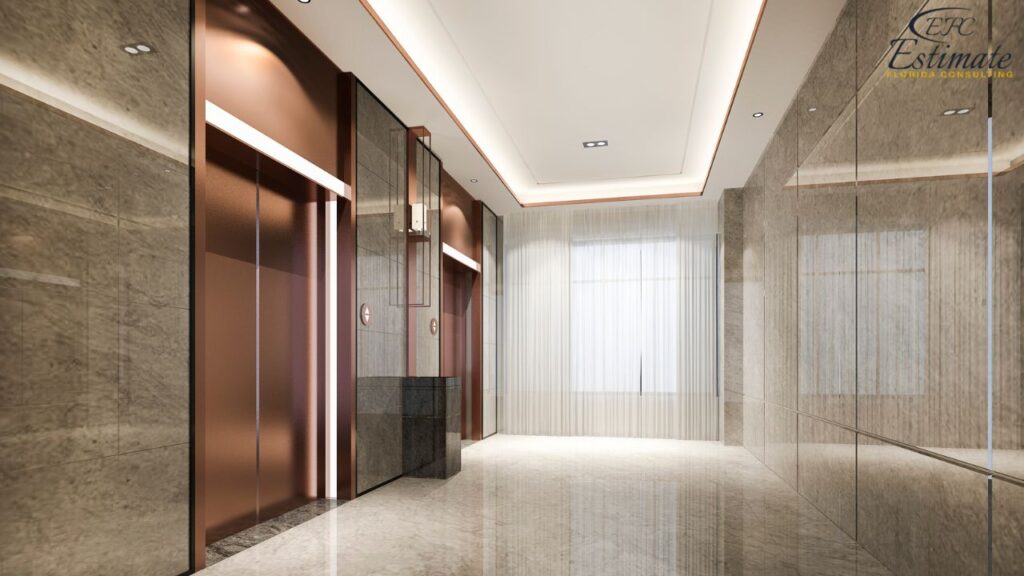
- Modernization: If retrofitting an existing building, additional costs may arise from structural modifications. Modernization projects often involve upgrading or replacing outdated elevator systems to improve performance, safety, and energy efficiency.
How to Save Money on Elevator Installation
Here are some tips to save money on elevator installation without compromising quality:
- Plan for Future Needs: Design the system with potential future expansions in mind to avoid costly upgrades. By anticipating future building requirements and traffic patterns, you can choose an elevator system that will accommodate growth without necessitating expensive modifications.
- Consider Standard Designs: Opt for standard designs where possible to reduce customization costs. Standard elevator models are often more cost-effective because they are pre-engineered and require less time and resources to install.
- Negotiate with Suppliers: Work with suppliers to secure the best possible pricing on materials and equipment. Building strong relationships with suppliers can lead to discounts or favorable terms that reduce overall project costs.
- Explore Energy Efficiency Incentives: Investigate potential tax credits or rebates for installing energy-efficient systems. Taking advantage of government incentives can offset initial installation costs and improve the long-term financial benefits of the elevator system.
Download Template For Apartment Elevators Project Breakdown
- Materials list updated to the zip code
- Fast delivery
- Data base of general contractors and sub-contractors
- Local estimators

Conclusion
Installing an elevator in an apartment building is a major investment that enhances accessibility, tenant satisfaction, and property value. At Estimate Florida Consulting, we offer precise cost estimates to help you budget effectively for this essential feature. The installation costs, ranging from $60,000 to $300,000, depend on factors like elevator type, building structure, and desired features. Our guide provides insights into these costs, allowing you to optimize your investment for maximum performance and longevity. By understanding these variables, property managers can make informed decisions that increase market value and improve tenant satisfaction. An elevator not only boosts convenience and accessibility but also broadens the tenant base by catering to residents with mobility challenges, ultimately enhancing property appeal.
FAQs
The cost of installing an elevator varies based on factors such as the type of elevator, building structure, number of floors, and specific features desired. New constructions and retrofits have different cost implications.
The average cost ranges from $60,000 to $300,000, depending on the type of elevator, building requirements, and customization options.
The average installation cost typically falls between $100,000 and $150,000, including the elevator unit, labor, and necessary modifications.
Elevator capacity influences cost, with larger elevators requiring more robust systems. Costs range from $78,000 for standard capacity (up to 1,500 lbs) to $325,000 for large capacity (up to 4,000 lbs).
Elevator costs vary by feature set: Basic features range from $78,000 to $130,000, advanced features range from $130,000 to $234,000, and premium features range from $234,000 to $390,000.
Energy-efficient elevators cost between $120,000 and $250,000, offering up to 40% energy savings, reduced carbon footprint, and potential tax incentives.
For large complexes, costs can range from $300,000 to $1,500,000, depending on the number of elevators and floors, with careful planning needed for seamless integration.
Labor costs account for 30-40% of the total installation cost, ranging from $20,000 for basic installations to $120,000 for custom work in complex projects.
Low-cost installations range from $60,000 to $80,000, featuring basic systems ideal for budget apartments and small buildings.
Medium-cost installations range from $100,000 to $150,000, offering improved materials, energy efficiency, and moderate customization for mid-range properties.
High-cost installations exceed $150,000, prioritizing premium materials, advanced features, and high performance, suitable for luxury and high-rise buildings.
The calculator provides personalized estimates based on building parameters and preferences, aiding in informed decision-making and cost optimization.
Costs are influenced by building height, customization, installation complexity, and regulatory compliance, which can add to expenses.
Additional costs include permits and inspections, maintenance contracts ($2,000 – $5,000 annually), and potential modernization for existing buildings.
Google Reviews



Process To Get The Elevator Cost Estimate Report
Here I am going to share some steps to get the elevator cost estimate report.
-
You need to send your plan to us.
You can send us your plan on info@estimatorflorida.com
-
You receive a quote for your project.
Before starting your project, we send you a quote for your service. That quote will have detailed information about your project. Here you will get information about the size, difficulty, complexity and bid date when determining pricing.
-
Get Estimate Report
Our team will takeoff and estimate your project. When we deliver you’ll receive a PDF and an Excel file of your estimate. We can also offer construction lead generation services for the jobs you’d like to pursue further.

